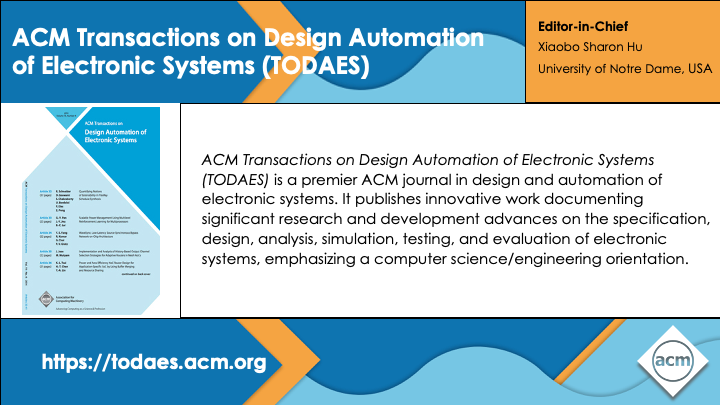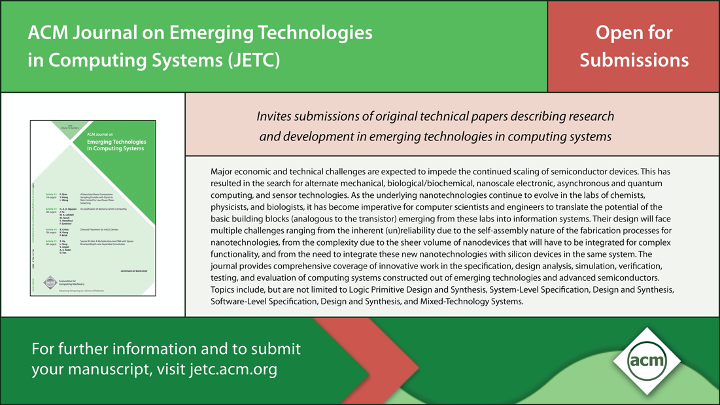|
|
GLVLSI 2021 Best Paper Award:
Best Paper Award:
Characterization and Mitigation of Electromigration Effects in TSV-Based Power Delivery Network Enabled 3D-Stacked DRAMs
Bobby Bose and Ishan Thakkar
2nd place:
MT-DLA: An Efficient Multi-Task Deep Learning Accelerator Design
Mengdi Wang, Bing Li, Ying Wang, Cheng Liu, Xiaohan Ma, Xiandong Zhao and Lei Zhang
3rd place:
IRONMAN: GNN-assisted Design Space Exploration in High-Level Synthesis via Reinforcement Learning
Nan Wu, Yuan Xie and Cong Hao
GLVLSI 2021 Service Award Recipients:
Dr. Tinoosh Mohsenin
Dr. Weisheng Zhao
Dr. Avesta Sasan
Dr. Ioannis Savidis
Dr. Ahmad Reza Sadeghi
Dr. Fan Chen
Dr. Binghui Wang
The 31st edition of GLSVLSI will be held as an online conference.
Original, unpublished papers describing research in the general
areas of VLSI and hardware design are solicited.
Stay tuned for more information.
In addition to the traditional topic areas of GLSVLSI listed below,
papers are solicited for a special theme of “Machine learning in CAD, EDA, and VLSI Design and Security”.
Program Tracks
-
VLSI Design: ASIC and FPGA design, microprocessors/micro-architectures, embedded
processors, analog/digital/mixed-signal systems, NoC, SoC, IoT, interconnects, memories,
bio-inspired and neuromorphic circuits and systems, BioMEMs, lab-on-a-chip, biosensors,
implantable and wearable devices.
-
VLSI Circuits and Power Aware Design: analog/digital/mixed-signal circuits,
RF and communication circuits, chaos/neural/fuzzy-logic circuits, high-speed/low-power
circuits, temperature estimation/optimization, power estimation/optimization, machine-learning
for design and optimization of analog/digital/mixed-signal circuits, clock and power network optimization
through applied machine-learning.
-
Computer-Aided Design (CAD): hardware/software co-design, high-level synthesis,
logic synthesis, simulation and formal verification, layout, design for manufacturing,
CAD tools for biology and biomedical systems, algorithms and complexity analysis.
-
Testing, Reliability, Fault-Tolerance: digital/analog/mixed-signal testing,
reliability, robustness, static and dynamic defect- and fault-recoverability,
variation-aware design.
-
Emerging Computing & Post-CMOS Technologies: nanotechnology, molecular and quantum
computing, approximate and stochastic computing, sensor and sensor networks, post CMOS VLSI.
-
Hardware Security: trusted IC, IP protection, hardware security primitives, reverse
engineering, hardware Trojan, side-channel analysis, CPS and IoT security.
-
VLSI for Machine Learning and Artificial Intelligence: hardware accelerators for machine
learning, computer architectures for machine learning, deep learning, brain-inspired computing, big data
computing, cloud computing for Internet-of-Things (IoT) devices.
-
Microelectronic Systems Education: pedagogical innovations using a wide range of technologies
such as ASIC, FPGA, multicore, GPU, educational techniques including novel curricula and laboratories,
assessment methods, distance learning, textbooks, and design projects, Industry and academic collaborative
programs and teaching.
Important Dates
|
Call for Papers
|
|
Paper submission deadline:
|
January 31, 2021, 9pm EST February 28, 2021, 9pm EST
|
|
|
|
Call for Special Sessions
|
|
Proposal submission deadline:
|
February 28, 2021, 9pm EST March 18, 2021, 9pm EST
|
|
|
|
Notification of acceptance/rejection:
|
April 10, 2021
|
|
|
|
Camera-Ready Paper Due:
|
|
Papers:
|
April 26, 2021
|
|
Pre-recorded videos:
|
May 16, 2021
|
Author Guidelines
Paper Submission: Authors are invited to submit full-length (6 pages maximum), original, unpublished papers along
with an abstract of at most 200 words. To enable blind review, the author list should be omitted from the main document.
Previously published papers or papers currently under review for other conferences/journals should NOT be submitted and
will not be considered. Electronic submission in PDF format to the http://www.glsvlsi.org
website is required. Author and contact information (name, affiliation, mailing address, telephone, fax, e-mail) must be
entered during the submission process.
Paper Format (camera-ready): Submissions should be in camera-ready two-column format, following the ACM proceedings specifications
located at: ACM Template
and the classification system detailed at: ACM 2012 Class
For LaTeX users, please use the ACM sigconf template.
Paper Publication and Presenter Registration: Papers will be accepted for regular or poster presentation at the symposium.
Every accepted paper MUST have at least one author registered to the symposium by the time the camera-ready paper is submitted;
at least one of the authors is also expected to attend the symposium and present the paper.
This site is maintained by:
GLSVLSI 2021 Webmaster
Yi-Chung Chen (ychen@tnstate.edu),
Tennessee State University.
|











